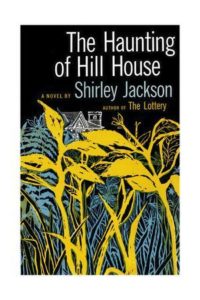 I’ve lately come to enjoy listening to podcasts while I walk around my neighborhood. A good one I happened upon was a profile of Stephen King, who is on my A-list of favorite writers. He contends that one of the greatest novels of the supernatural written in the last hundred years is “The Haunting of Hill House” by Shirley Jackson.
I’ve lately come to enjoy listening to podcasts while I walk around my neighborhood. A good one I happened upon was a profile of Stephen King, who is on my A-list of favorite writers. He contends that one of the greatest novels of the supernatural written in the last hundred years is “The Haunting of Hill House” by Shirley Jackson.
Hearing that was enough to convince me to log onto amazon and order a copy. Halloween was fast approaching and I needed a column.
I remember Shirley Jackson from high school. In tenth grade English class, we studied her unforgettable short story “The Lottery,” first published in 1948 in The New Yorker. The story knocked my socks off the first time I read it, so I was thrilled to find and reread it online just a couple of weeks ago. Though I’d forgotten some of the details, I found “The Lottery” just as riveting and disturbing now as it was 50 years ago. Maybe more so.
In a small town of about 300 people, the citizens have gathered on the town square on a lovely summer morning for the annual lottery. This tradition, which the townspeople believe brings prosperity and good fortune to their community, has gone on for decades. Folded slips of paper, all but one of which are blank, are placed in a box. The head of each household draws one paper from the box. The paper marked with a black dot is the winner. Again, folded slips of paper—exactly enough for each member of the winning household and all blank except one—are placed back in the box. Each family member draws one. Again, the winner’s paper has a black dot on it.
As to what the lottery winner wins, I’m not about to reveal. If you’ve ever read the story, you know. If you haven’t, you probably should.
But back to “The Haunting of Hill House,” which has twice been made into a movie and is now a series streaming on Netflix. I haven’t seen any of the screen versions and probably never will. I’m just too big a chicken. “Hill House” is considered one of the best literary ghost stories of the 20th Century. The novel was a finalist for the 1959 National Book Award and has been described as a perfect work of unnerving terror. When I found that out, I almost changed my mind about reading it. Maybe I could write a Halloween column about something less scary. Candy, for instance. Or why no one wants to wear a mask to trick-or-treat because even children are sick of masks.
There’s very little gore in “The Haunting of Hill House.” No chain saws. No zombies. No buckets of blood. Instead, its terror is almost wholly psychological. In early summer, four seekers arrive at the ancient, isolated manor. Professor Montague is an occult scholar looking for solid evidence of paranormal activity. Luke is the nephew of the current owner and is the future heir of Hill House. Theodora is a mean girl masquerading as a free spirit. Eleanor, a friendless, fragile, introverted young woman, is the novel’s protagonist.
Hill House itself is the main character.
Lest I give too much away, I’ll say only that the story includes a tragic carriage accident, a suicide, a housekeeper and her caretaker husband who insist on being gone from the property before night falls, spooky hallways and windowless interior rooms, cold spots in the nursery and unexplained banging on bedroom doors in the middle of the night. Even as I write about the book, shivers run up and down my spine.
If you take that as a recommendation, heed this warning. Whatever you do, don’t read “The Haunting of Hill House” after the sun goes down. Please oh please.
(October 24, 2020)